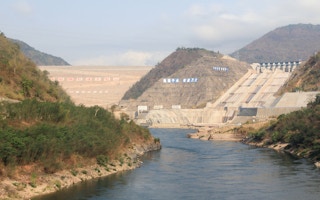A sharp rise in renewable energy projects around the world over the last decade has been accompanied by an increase in human rights abuses perpetrated by renewables companies and their affiliates, a report by a UK-based non-profit group has alleged.
The study, by Business & Human Rights Resource Centre (BHRC), documents how renewables firms, particularly in developing countries, are failing to meet international standards for engaging with the local communities where mainly wind and hydropower projects are being implemented.
The report highlights cases of illegal land-grabbing, intimidation and violence, while the large majority of those featured in the research admitted to failing to meet basic rules of engagement around free, prior and informed consent (FPIC).
FPIC is the principle that a community has the right to give or withhold its consent to a project that may affect the lands they own, occupy or use.
Incidences of human rights abuses have increased in step with a rise in renewable energy projects that has followed the Paris Agreement on climate change in 2015, the study found.
Over the last 12 years, global investment in renewable energy projects has increased almost fivefold, from $62 billion in 2004 to $287 billion in 2016.
Many of the projects in Asia profiled by BHRC concern hydropower; a dam in India that allegedly deprived villagers of access to water, a dam in Sarawak, Malaysia, that infringed on local people’s land rights and was linked to the intimidation and detention of indigenous people, and a dam in Laos that was built without adequate consultation with local communities.
Also among the profiled cases was a wind project in Taiwan that allegedly involved violence by security forces against protesters.
The report suggested that renewables projects are running into similar problems faced by the extractive industry because both involve the large scale use of land.
These include operational delays, legal costs and reputational risks, which are likely to mean lower financial returns for investors, as well as increased operational and capital expenditure, the report noted.
“It is not acceptable for any business to ignore their impacts on peoples’ land rights, security or livelihoods - the renewable energy sector is no different,” Mary Robinson, President, Mary Robinson Foundation – Climate Justice, was quoted in the report as saying.
The report featured a study of 50 companies involved in renewable energy projects. They were asked 10 questions about their approach to human rights in November last year.
Only 10 per cent of firms referred to the international standard of FPIC in their responses, and three out of these five companies faced allegations from communities on implementing this commitment on the ground.
Two of the countries — Malaysia and Myanmar — where renewables projects have proved the most problematic, measured by the number of complaints from community groups registered with BHRC, are in Asia.
Colombia has registered the most complaints, followed by Malaysia, Mexico, Myanmar and Brazil.
In a word of caution for renewable energy investors, the report states that failing to consider human rights impacts when pursuing green investments “not only goes against international standards and legal obligations, but could jeopardise the financial returns and long-term success of an investment, considering the associated legal, reputational and operational risks.”
Renewable investors are especially well placed to drive best practice in the project in which they invest, the report suggested.
The report cites the United Nations Guiding Principles on Business and Human Rights (UNGPs), and the OECD’s Responsible Business Conduct guidelines as sources renewables companies can use to ensure their practices do not impinge on human rights.

















